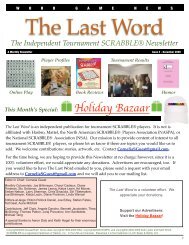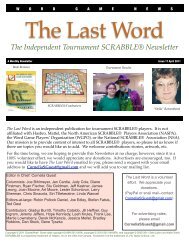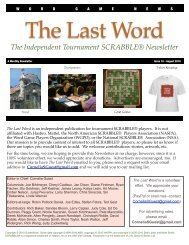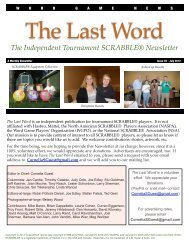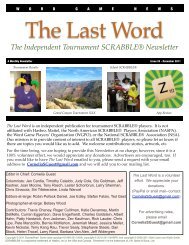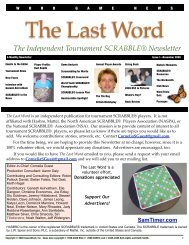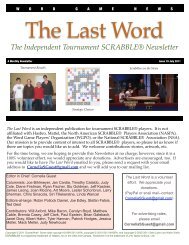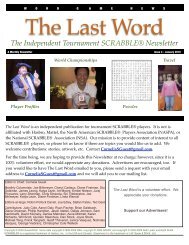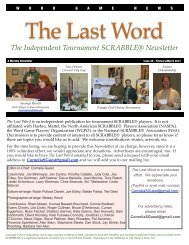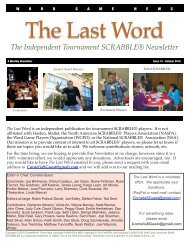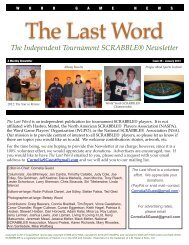February 2010 - The Last Word Newsletter
February 2010 - The Last Word Newsletter
February 2010 - The Last Word Newsletter
Create successful ePaper yourself
Turn your PDF publications into a flip-book with our unique Google optimized e-Paper software.
<strong>The</strong> <strong>Word</strong>smithT H E W O R D S M I T H“A week’s worth of words”by Chris Sinacola<strong>The</strong> chief obstacle standing between most SCRABBLE® players and a higher rating and greatersuccess in club and tournament play is simply not knowing enough words. Strategy is significant, ofcourse, and well worth attention once you have developed a solid vocabulary, but the best strategywon't carry you far if you don't have the word weapons you need.If you don't believe me, spend a few hours playing Quackle (www.quackle.org) and keep track bothof what the program finds and what you miss.<strong>The</strong> cure for ignorance is, of course, hard work and study. Methodical study of the SCRABBLE®dictionary is essential to success, as is some kind of systematic approach to anagrams of sevenand eight letters.But I have always felt that learning words out of context, without much mind to definitions, part ofspeech, and usage, drains the game of much of its beauty. Not every player will agree, of course.Those intent on rapid advancement, or those who view SCRABBLE® as another in a series ofgame “puzzles” to be solved and conquered, may see it as little more than committing to memorywhich strings of letters are valid and which are not.I much prefer to dwell in the language, and as various interesting and unusual words crossed mydesk this week, I got to thinking exactly how many “new” words someone immersed in languagemeets in a given week. And make no mistake – we are all immersed in language in this age andculture.Here are a few that I met in recent days in the course of reading newspapers, books, magazines;listening to the various media; and, of course, playing SCRABBLE®.Reading Michael Pollan's best-selling <strong>The</strong> Omnivore's Dilemma, I happened upon this sentence,describing the dominance of corn in our domestic food supply: “It's a good thing this plan can't forman impression of us, for how risible that impression would be: the farmers going broke cultivating it;the countless other species routed or emiserated by it....”I stopped at emiserated, a wonderful example of a word – if it is a word, SCRABBLE® playerswould quickly add – whose meaning is almost immediately clear. It surely wants to express theprocess of making poorer, or a reduction to a state of miserliness. And yet, something about itdoesn't look quite right.I call a quick timeout here to to note that whether something “is or is not a word” doesn't mean allthat much. Anything we see in print is commonly referred to as a word, even if it appears nowhereelse and has no generally accepted meaning. But there are many perfectly valid words that are notacceptable in SCRABBLE®, and when you stop to consider the neologisms that Shakespeare,Melville, and Joyce engaged in (to name just three of the most poetical offenders of the linguisticstatus quo), it's clear that the OWL-2 is rather limited in scope. 43



